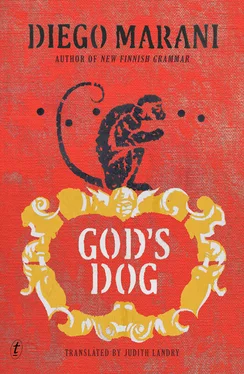DIEGO MARANI was born in Ferrara in 1959. He has worked as a translator and policy officer for the European Commission and has written several other novels, collections of essays and short stories. Marani has been awarded the Campiello Prize, the Stresa Prize for The Last of the Vostyachs , as well as winning the Bruno Cavallini Prize. New Finnish Grammar has received the Grinzane-Cavour Prize, was shortlisted for the Independent Foreign Fiction Award, and the Best Translated Book Award, and longlisted for the European Book Prize. Marani invented the mock language Europanto, in which he has written columns for European newspapers. He lives in Brussels with his wife and two children.
JUDITH LANDRY is a translator of works of fiction, art and architecture. Her translations include The Last of the Vostyachs by Diego Marani, The House by the Medlar Tree by Giovanni Verga, The Devil in Love by Jacques Cazotte, A Bag of Marbles by Joseph Joffo, and Smarra & Trilby by Charles Nodier. In 2012, she was awarded the Oxford-Weidenfeld Translation Prize for Marani’s New Finnish Grammar .
‘My name is Domingo Salazar, I was born on the feast of Saint Dominic and brought up by the Dominican Fathers. I am a policeman, I see to it that the laws of our Holy Mother Church are respected and I work for the worldwide spread of that same Church. I never knew my parents, but from the colour of my skin I think they must have been Caribbean, or at least of mixed race. The Fathers found me beneath the rubble of the orphanage of the Holy Cross, in Haiti, in 2010, and brought me to Italy. I grew up in the boarding-school run by the Dominican sisters of Saint Imelda, I studied at the patriarchal monastery in Bologna and then at the Papal Police Academy in Rome, which I left with the rank of inspector in the fifth year of the reign of Pope Benedict XVIII.’
He had developed this mania for diary-keeping as a result of the time he had spent with the nuns. ‘Time to get writing!’ the mother superior would say after tea, throwing open the grey door to the wood-panelled main hall. You still wrote with pen and paper in those days, in an exercise-book backed with black cloth which was chained to the desk, and which the sisters would read through later. So this diary had become a detailed account of his life, divided up into years. But Domingo Salazar would always copy out those first same sentences in every new exercise-book he began, as though to remind himself of who he was.
It was almost time for his appointment. Outside it was already dark. He had slept much of the afternoon; he had thrown himself on to the bed the moment he’d arrived, without even opening his suitcase. His flight had left at dawn, and he’d spent the whole previous night writing, as he always did. He washed himself in cold water, then shaved and dressed slowly in front of the mirror in the bathroom. He picked up his pistol-case from the chair and strapped it on under his arm. He didn’t like the sound of this new mission. He didn’t yet know much about it, but hunting down angels of death was a job for an ordinary municipal policeman, not an inspector like himself. Those Free Death Brigades struck him as amateurs, hot-heads with few means and even less experience. For all he knew, they might not even be organised into a proper group; they were stray dogs embarking on wild-goose chases. But orders were orders, and at seven o’clock he would learn further details about his assignment from the Vicar.
He arrived at Sant’Andrea della Valle just as evening mass was ending. The priest gave the blessing and the faithful started trooping out. Salazar went up to the confessional to the right of the nave. The curtain was half-open, but the priest’s seat was empty, as was the one in the other confessional to the left. He walked up and down, pretending to examine the frescoes, then went back into the apse. By now the church was empty, except for an altar-boy who was putting out the candles. Salazar decided to go and kneel before one of the two confessionals at random, imagining that the Vicar, were he in the church, would come and join him. An agent and his Vicar must never see or know each other; they were not to use mobiles or e-mail; communication between them had to be exclusively oral. This was the number one safety rule for the secret agents of the papal police. The meeting-place was a confessional in the church referred to in the mission order, itself the only written document — unsigned — which would remain in the registers of the barracks to which the agent in question belonged. When an agent on a mission lost contact with his Vicar, he had to present himself at the nearest Swiss Guards post for an identity check. That was the only way he could be reinstated in the corps. Otherwise he himself became an outlaw, and might be eliminated. Salazar went back into the nave and up to the nearest confessional, the one on the left. Coming from the chapel, he couldn’t see the seat but, as he approached, he saw two black shoes on the footstool. Well, he thought, the Vicar’s here at last. He was about to kneel down when the purple curtain was nudged aside by an elbow; for one brief instant, Salazar saw the fingertips of two white hands holding a glass bulb, witnessed the delicate gesture made by a one-eyed man slipping his prosthesis into an empty socket. Then the curtain was almost closed again, and the man’s face was sunk in shadow. Embarrassed by his unintentional intrusion, Salazar took a few steps backwards before going to kneel down, hoping that the Vicar had not noticed anything. He could hear breathing through the openwork grille. As agreed, he recited the Credo, gave his registration number and then waited, in silence.
‘Inspector Salazar, I know you to be a faithful soldier in the service of our Holy Mother Church. I know your superiors, and they have confirmed your gifts in this regard. Furthermore I know you to have an excellent record, a decoration and various recommendations. I also know about your activities in Beirut and I congratulate you on them. We could do with more agents with such initiative! If I have called you here from Amsterdam, it is because I have a delicate task to entrust to you. You see, of all the dangers threatening our Holy Mother Church, none is more terrible than the practice of free death, which is becoming ever more widespread in this depraved world of ours. Euthanasia, as miscreants and scientists refer to it, destroys what God holds dearest, namely, the life He has given us. Euthanasia does away with the mystery of pain, which should be so revered. It’s not just a question of dogma, Salazar. Our hold on people’s consciences is also at stake. If men cease to fear death, or begin to regard it as something run-of-the-mill, our sway over them is seriously threatened. We are already conducting an active campaign of propaganda and dissuasion, but it’s no longer enough. What is called for is repression, carefully handled, and above all covert. People must not be aware of the restraints which bind them. The first part of your mission will be this, Salazar. You will inspect the hospitals in the fourth zone and keep an eye on such terminally ill patients as might be seeking death. You will need to know everything about them, every last detail of their lives. You will have to glean information about their relatives, their friends, their intimate ties. You will have to delve into their past and know their every ambition and achievement. And also what they own: because, as you well know, inspector, the law authorises the Church to seize the goods of those who die an unnatural death, and this is a powerful weapon in our armoury. Even the most ardent euthanasiast thinks twice before seeing his own children disinherited. You will also keep a close eye on the medical staff. As we know, despite the purges, many abortionists are still active within their ranks. Even the smallest detail should be taken into account, Salazar. You will have to keep the closest watch on every dying man. You will have to be able to tell from their expressions if theirs is willing suffering, or if they are rebelling against their fate. That is when they fall under the spell of the fanatics. We know that euthanasiasts make converts in hospitals. There they have a captive audience, and it is easy to convince sick people that they might wish to hasten their own end. But if you succeed in breaking this vicious circle, then we shall deprive them of their main sources of financial support. Because — and it is important to remember this — the sick actually pay to have themselves disposed of! It is only by thwarting their hold over sick people that we shall ultimately succeed in routing the angels of death!’
Читать дальше












